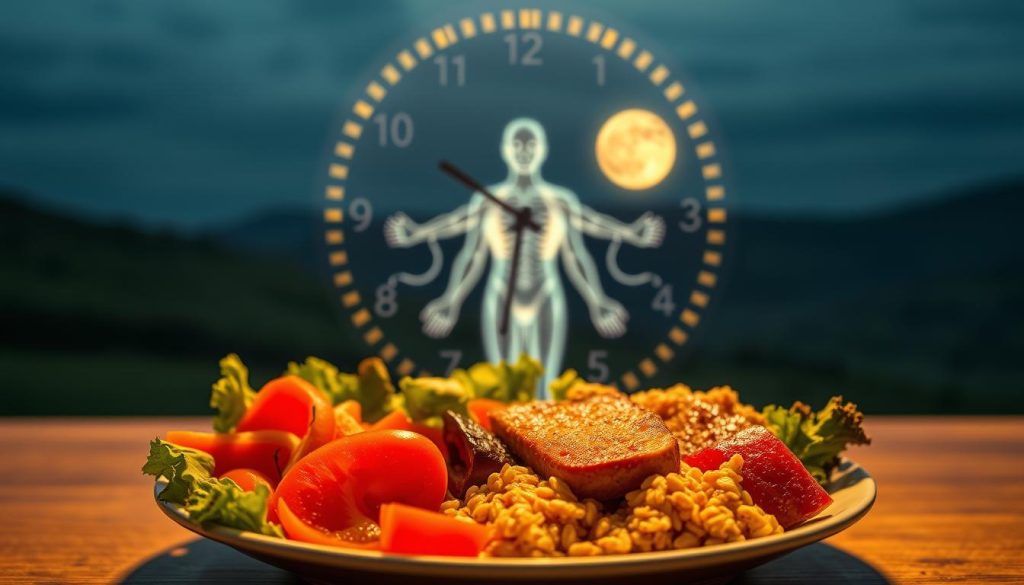Find out how meal timing and circadian rhythm are connected. Eating at the right times can really help your metabolism. Our body’s natural clock controls many processes, like metabolism and energy levels.
By matching our meals with this clock, we can improve our health and performance.
Knowing how eating times affect our body’s rhythms can be very beneficial. It’s important to think about when we eat to boost our energy and keep our metabolism in check.
Understanding Circadian Rhythm and Its Impact on Health
Our circadian rhythm is a natural process that controls our sleep-wake cycle. It matches the 24-hour day. This system, also called our body clock, affects many health processes. Knowing its benefits is key to better daily routines and health.
Definition and Explanation
The circadian rhythm manages our sleep, hormone levels, and metabolism. It keeps our body in sync with the outside world. It makes us feel awake during the day and sleepy at night, helping us stay healthy.
How Circadian Rhythm Influences Bodily Functions
Our body’s functions are tied to our circadian rhythm. Problems with this rhythm can cause health issues like sleep disorders and hormonal imbalances. For example, irregular sleep can affect hormone levels, impacting hunger and stress responses.
Understanding and following our body clock can improve health. It leads to better sleep, metabolism, and overall well-being.
The table below shows how the circadian rhythm controls our body at different times:
| Time | Bodily Function | Impact |
|---|---|---|
| 6:00 AM – 9:00 AM | Increase in blood pressure | Prepares the body for wakefulness |
| 12:00 PM – 3:00 PM | Optimal digestion and metabolism | Supports energy production and nutrient absorption |
| 9:00 PM – 12:00 AM | Melatonin secretion | Induces sleepiness and aids in sleep regulation |
The Importance of Meal Timing
Understanding meal timing is key for better health and well-being. Eating in sync with our body’s natural rhythm boosts how we use nutrients. This leads to more energy and better weight control.
Optimal Meal Timing for Metabolism
Timing meals right is vital for a healthy metabolism. Eating when our body is most active boosts nutrient use. This helps manage weight and lowers disease risk.
Benefits of Eating on a Regular Schedule
Regular meals are good for our health. They keep blood sugar stable, prevent overeating, and maintain energy. Following a natural eating schedule improves both physical and mental health.
Meal Timing and Circadian Rhythm
Understanding how meal timing affects our health is key. Eating at the right times helps our body work better. It boosts energy and helps prevent health problems like metabolic syndrome.
Synchronizing Meals with Your Body Clock
Your body has a natural clock that controls many things, like sleep and digestion. Eating when your body tells you to can improve digestion and sleep. It also helps your body use food better.

Long-term Health Implications
Eating in sync with your body’s clock is good for your health now and in the future. It can lower the risk of diseases like diabetes and heart problems. Regular eating helps keep your blood sugar stable and reduces inflammation.
Optimal Eating Schedule for Circadian Rhythm
Aligning your eating schedule with your body’s natural circadian rhythm can boost your health and well-being. It helps regulate your metabolism, improves digestion, and keeps your energy levels up all day. Let’s look at the best times for meals and how to snack healthily.
Best Times to Consume Major Meals
Eating at the right times can make you feel more energetic and keep your metabolism working well. Time-restricted eating means eating within a certain window to match your body’s clock. Breakfast should be eaten within an hour of waking up to start your metabolism.
Lunch, as your main meal, should be eaten around mid-day when your body can digest best. Dinner should be eaten at least three hours before bed to help with digestion and avoid sleep problems.
Snacking: When and How Much
Snacks are important between meals, but they should be light and in small amounts. Avoid eating too much at night to keep your sleep and metabolism on track. The best times for snacks are mid-morning and mid-afternoon.
Creating an eating schedule that fits your circadian rhythm takes planning and understanding your body’s needs. By following time-restricted eating and healthy snacking, you can improve your overall health. Tailoring your meal times leads to a balanced and healthy lifestyle.
Circadian Rhythm Meal Plans
Designing your diet around your body’s natural rhythms can boost health and happiness. Circadian rhythm meal plans mean eating at times that match your internal clock. Let’s look at a sample meal plan and how it can fit different lifestyles.
Sample Meal Plan Aligning with Circadian Rhythm
Having a structured meal plan helps keep your energy levels steady all day. Here’s a sample plan:
- 7:00 AM: Breakfast – Overnight oats with fresh berries and a protein smoothie.
- 12:00 PM: Lunch – Grilled chicken salad with mixed greens and a quinoa side.
- 3:00 PM: Snack – A handful of almonds and a piece of fruit.
- 6:00 PM: Dinner – Baked salmon, steamed broccoli, and sweet potato.
- 8:00 PM: Evening Snack – Greek yogurt with a drizzle of honey.
Adjustments for Different Lifestyles
It’s key to adjust circadian rhythm meal plans to fit your life. Personalized nutrition helps make meal timing work for you.
- Early Risers: Start with a big breakfast around 6:00 AM and adjust the rest of your meals.
- Night Owls: Push your meal plan back an hour or two to match your later wake-up time.
- Shift Workers: Plan meals around your work hours, but don’t skip big meals.
By making your nutrition personal and following meal times that fit your life, you can feel more energetic and healthy. This makes eating both useful and fun.
Meal Timing Impact on Metabolism
The timing of your meals can greatly affect your metabolism. This shows how important meal timing and metabolism are. Eating at certain times can help your body use energy better, leading to better weight management and health.
Calorie distribution during the day is also key. Eating more in the morning and less at night can improve energy use and metabolism. This matches our natural rhythms, which are active during the day.
Eating a big breakfast can increase thermogenesis, or heat production in the body. This early boost in metabolism helps burn more calories and may lower obesity risk. But eating late at night can mess with our natural rhythm, leading to poor energy regulation and weight gain.
Here’s a sample meal plan to show the benefits of smart calorie distribution:

| Meal | Recommended Time | Caloric Intake |
|---|---|---|
| Breakfast | 6:30-8:30 AM | 35-40% of daily calories |
| Lunch | 12:00-2:00 PM | 30-35% of daily calories |
| Dinner | 6:00-8:00 PM | 20-25% of daily calories |
| Snacks | As needed | 5-10% of daily calories |
This meal plan helps regulate energy and keeps metabolism going. It supports better health by using our body’s natural rhythms to improve metabolism.
Circadian Rhythm and Digestion
The connection between circadian rhythm and digestion is complex but very important for our health. Knowing how our body’s internal clock affects digestion can improve how we digest food and our gut health. Eating at the right times helps our body absorb nutrients better and work more efficiently.
Role of Circadian Rhythm in Digestive Efficiency
Our circadian rhythm controls many body functions, including when digestive enzymes are released. These enzymes are key for breaking down food into nutrients. Eating when our body’s rhythm tells us to can make digestion smoother and improve how we use nutrients.
Importance of Consistent Meal Times for Gut Health
Having regular meal times is crucial for gut health. Eating at odd times can upset the balance of good bacteria in our gut. This can cause problems like bloating, discomfort, and irregular bowel movements. So, eating at the same times every day helps keep our gut healthy and balanced.
Let’s look at how meal timing affects digestion and gut health:
| Factors | Impact on Digestion | Impact on Gut Health |
|---|---|---|
| Regular Meal Timing | Enhanced enzyme activity, improved nutrient absorption | Stable gut biome, reduced digestive discomfort |
| Irregular Meal Timing | Reduced enzyme efficiency, impaired digestion | Disrupted gut biome, increased risk of GI issues |
The link between circadian rhythm and digestion is key to good digestion and gut health. By eating when our body tells us to, we help our digestive system work its best. This supports our overall health and well-being.
Benefits of Timing Meals with Circadian Rhythm
Aligning meal times with your body’s natural circadian rhythm can greatly improve your well-being. It’s not just about better digestion. It also boosts sleep quality and mental performance, leading to a healthier life.
Improved Sleep Patterns
Timing meals with your circadian rhythm can lead to better sleep. It helps regulate your body’s functions, including sleep hormones like melatonin. Eating too close to bedtime can mess with your sleep, but aligning meals with your rhythm ensures a good night’s rest.
Enhanced Mental Clarity and Focus
Another big plus is better mental clarity and focus. Eating when your body is most ready, especially during peak metabolic times, feeds your brain well. This improves your mental sharpness, keeping you alert and focused all day. Eating balanced meals at set times boosts your brain’s functions and increases your productivity.
Challenges in Syncing Meal Timing with Circadian Rhythm
Syncing meal timing with the circadian rhythm is key to good health. But, it’s not always easy. Knowing the obstacles and finding ways to eat better can help people overcome these hurdles.
Common Roadblocks
Irregular work schedules are a big challenge, especially for those working nights or under stress. Social events and family duties can also mess up meal times. Traveling across time zones adds more complexity to keeping a regular eating schedule.
Strategies to Overcome Challenges

- Plan Ahead: Cooking meals before you know your schedule can help.
- Set Alarms: Digital reminders can keep you on track, even when you’re busy.
- Flexible Snacking: Choose snacks that are easy to eat on the move.
- Gradual Adjustments: Change your eating times slowly to avoid shock to your body.
Using these strategies can help you align your meals with your body’s natural rhythm. This not only boosts your metabolism but also improves your overall health and happiness.
| Challenge | Adaptive Eating Strategy |
|---|---|
| Irregular Work Schedules | Plan meals in advance |
| Social Obligations | Set reminders for meal times |
| Frequent Travel | Flexible, healthy snacking |
| Stressful Environments | Gradual schedule adjustments |
Circadian Rhythm Eating Habits
It’s key to have strong circadian rhythm eating habits for your body to work well. Eating at the same times every day helps your digestion and metabolism. This makes you healthier.
Developing Habits for Long-term Success
Creating a routine for eating is important. It should match your body’s natural rhythm. Start by picking specific times for meals and stick to them. This helps your body get ready for food, making you healthier.
- Eat breakfast within an hour of waking up to kickstart your metabolism.
- Schedule lunch approximately four to five hours after breakfast.
- Consume dinner at least three hours before bedtime for better digestion.
Tips for Sustainable Meal Timing
To keep your eating habits going, try these tips. They’re easy to add to your routine. They help you stay in sync with your body’s natural rhythm.
- Plan Ahead: Prepare meals in advance to avoid unplanned eating.
- Stay Consistent: Stick to your eating schedule even on weekends and holidays.
- Listen to Your Body: Pay attention to natural hunger cues rather than eating out of habit.
- Stay Hydrated: Drink water throughout the day to maintain hydration and support digestion.
By following these tips, making healthy eating routines is easier. Your body will work better with its natural rhythm.
Scientific Evidence Supporting Meal Timing
Aligning our eating habits with our body’s natural rhythm is backed by science. Research on metabolic health shows how meal timing affects our well-being.
Studies on Meal Timing and Metabolic Health
Studies on metabolic health reveal that eating at set times each day is key. It helps keep insulin levels stable and boosts metabolic function. Eating breakfast soon after waking boosts metabolism.
On the other hand, skipping late-night snacks is crucial to avoid metabolic problems. A University of Surrey study found that irregular eating harms metabolic health. It increases the risk of obesity and type 2 diabetes.
Research on Circadian Rhythms and Eating Patterns
Research on circadian rhythms explores the link between our internal clocks and meal times. Harvard Medical School found that eating late disrupts glucose management. The Salk Institute’s study showed that eating with daylight improves metabolic health and energy.
Eating in sync with daylight boosts digestion and energy use. This ensures better health and vitality.
Practical Tips for Syncing Meals with Circadian Rhythm
Aligning your meals with your circadian rhythm can boost your health and well-being. Here are some tips to start syncing your meals with your body’s natural rhythm. First, set a meal schedule that matches natural light patterns. For example, have breakfast within an hour of waking up to boost your metabolism and energy.
Another good strategy is to keep your meal times consistent. Eat your main meals at the same times every day to help your body’s internal clock. Also, choose meals that fit your lifestyle. If you work out in the morning, eat a protein-rich breakfast to keep your energy up all day.
Finally, avoid eating heavy meals late at night. Eating big meals before bed can mess up your sleep and rhythm. Instead, have light, easy-to-digest snacks if you get hungry at night. By following these tips, you can better sync your meals with your body’s natural clock and enjoy many benefits.

